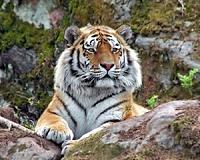 |
Washington DC (SPX) Apr 13, 2011 Fluctuations in penguin populations in the Antarctic are linked more strongly to the availability of their primary food source than to changes in their habitats, according to a new study published online in the Proceedings of the National Academy of Sciences. Funded in part by the Lenfest Ocean Program, this research indicates that species often considered likely "winners" of changing conditions, such as large-scale ice melting, may actually end up as the most vulnerable to the impacts of climate change. The two penguin species of focus in the study rely on small shrimp-like creatures known as krill for their survival. A previous assessment in Nature of krill in the Southern Ocean suggests that their abundance has declined as much as 80 percent since the 1970s. "For penguins and other species, krill is the linchpin in the food web. Regardless of their environmental preferences, we see a connection between climate change and penguin populations through the loss of habitat for their main food source," said Dr. Wayne Trivelpiece, lead author and seabird researcher of the National Oceanic and Atmospheric Administration's Antarctic Ecosystem Research Division. "As warming continues, the loss of krill will have a profound effect throughout the Antarctic ecosystem." A 30-year field study of Adelie (ice-loving) and chinstrap (ice-avoiding) penguins shows that populations of both species in the West Antarctic Peninsula and Scotia Sea have declined by respective averages of 2.9 and 4.3 percent per year for at least the last 10 years. Some colonies have decreased by more than 50 percent. Lack of an abundant supply of krill has been particularly hard on fledgling penguins that must learn where to locate and how to catch the prey on their own, having never been at sea before. Data from the study suggest that fewer young penguins are surviving this transition to independence today than in previous years when these crustaceans were much more abundant. Although chinstrap penguins avoid feeding in icy habitats, sea ice provides the necessary environment for krill to reproduce. Increasing temperatures and reductions in sea ice have made conditions unfavorable to sustain ample populations of this food source. The authors suggest that fishing for krill and increased competition among other predators also have made them less available to penguins. "Penguins are excellent indicators of changes to the biological and environmental health of the broader ecosystem because they are easily accessible while breeding on land, yet they depend entirely on food resources from the sea. In addition, unlike many other krill-eating top predators in the Antarctic, such as whales and fur seals, they were not hunted by humans," said Dr. Trivelpiece. "When we see steep declines in populations, as we have been documenting with both chinstrap and Adelie penguins, we know there's a much larger ecological problem." Adelie penguins, which feed in icy habitats, are also declining due to food shortages and shrinking habitat. They differ from chinstrap penguins, however, in that they have breeding populations outside of the western Antarctic, which makes them less vulnerable to the rapid warming in the Antarctic Peninsula region by comparison.
Share This Article With Planet Earth
Related Links Pew Environment Group Darwin Today At TerraDaily.com
 Scientists Have New Measure For Species Threat
Scientists Have New Measure For Species ThreatAdelaide, Australia (SPX) Apr 11, 2011 A new index has been developed to help conservationists better understand how close species are to extinction. The index, developed by a team of Australian researchers from the University of Adelaide and James Cook University, is called SAFE (Species Ability to Forestall Extinction). The SAFE index builds on previous studies into the minimum population sizes needed by species to survive in ... read more |
|
| The content herein, unless otherwise known to be public domain, are Copyright 1995-2010 - SpaceDaily. AFP and UPI Wire Stories are copyright Agence France-Presse and United Press International. ESA Portal Reports are copyright European Space Agency. All NASA sourced material is public domain. Additional copyrights may apply in whole or part to other bona fide parties. Advertising does not imply endorsement,agreement or approval of any opinions, statements or information provided by SpaceDaily on any Web page published or hosted by SpaceDaily. Privacy Statement |